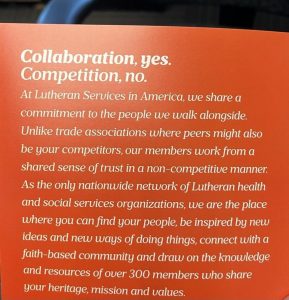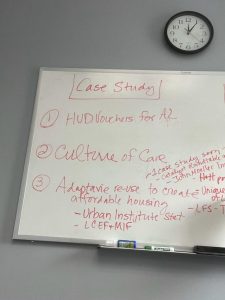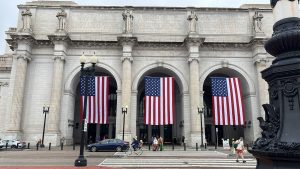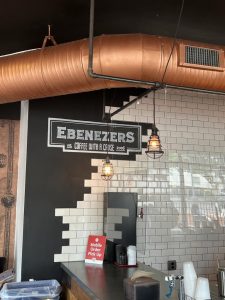 Through my time in REI development meetings and team member engagement meetings, I have appreciated Lutheran Services in America’s ability to utilize the strengths and weaknesses not only of those within their organization, but of their membership network. The LSA network consists of over 300 members all over the United States, and yet with such a big network, the goal is to make sure that each member gains and connects with LSA in a meaningful way, so as to emphasize the importance of intentional connection with the LSA network. In order to ensure members are getting enough out of the network, we have been working on the “Health and Housing” initiative. This has consisted of many one on one meetings with members of our housing collaborative to identify major projects in the pipeline, but also major stumbling blocks that people seem to be facing when it comes to implementing affordable housing. Through these meetings and conversations, LSA’s goal is to build a collaborative network that organizations and members can pull from for guidance and expertise, as well as pour into with their own shared experiences and knowledge.
Through my time in REI development meetings and team member engagement meetings, I have appreciated Lutheran Services in America’s ability to utilize the strengths and weaknesses not only of those within their organization, but of their membership network. The LSA network consists of over 300 members all over the United States, and yet with such a big network, the goal is to make sure that each member gains and connects with LSA in a meaningful way, so as to emphasize the importance of intentional connection with the LSA network. In order to ensure members are getting enough out of the network, we have been working on the “Health and Housing” initiative. This has consisted of many one on one meetings with members of our housing collaborative to identify major projects in the pipeline, but also major stumbling blocks that people seem to be facing when it comes to implementing affordable housing. Through these meetings and conversations, LSA’s goal is to build a collaborative network that organizations and members can pull from for guidance and expertise, as well as pour into with their own shared experiences and knowledge.  Several issues we identified through these one on ones were that there is limited public and private funding for members to pull from, and intense competition for LIHTC credits (Low Income Housing Tax Credit). Navigating funding limitations as well as the complexity of different local and state regulations and financing options has proved to be a common struggle of many of our members. With the knowledge of what their membership network is struggling with, LSA can thus facilitate nonprofit housing development expertise and technical guidance, as well as create a powerful national network through partners like LCEF or United Healthcare. LSA’s vicinity to capitol hill makes it a great place to advocate for change, and part of LSA’s mission is to be keenly aware of the issues their membership faces in order to assist with advocating for policies that support and drive the missions of their members.
Several issues we identified through these one on ones were that there is limited public and private funding for members to pull from, and intense competition for LIHTC credits (Low Income Housing Tax Credit). Navigating funding limitations as well as the complexity of different local and state regulations and financing options has proved to be a common struggle of many of our members. With the knowledge of what their membership network is struggling with, LSA can thus facilitate nonprofit housing development expertise and technical guidance, as well as create a powerful national network through partners like LCEF or United Healthcare. LSA’s vicinity to capitol hill makes it a great place to advocate for change, and part of LSA’s mission is to be keenly aware of the issues their membership faces in order to assist with advocating for policies that support and drive the missions of their members.
In terms of challenges I have faced thus far, I faced a terminology barrier when interviewing for the Health and Housing initiative. There is so much to learn in terms of the different types of housing, funding, and what policies have been in place thus far and what are currently in the works, and I found myself uneducated on much of the terminology that pertains to this specific area. I found a solution through taking copious amounts of notes to go back to and look over, so that even if I didn’t fully grasp some concepts at the moment, I could figure out what they meant through detailed google searches.
I had a unique experience early on at LSA where I sat in on a meeting regarding LSA’s mission statement. Through this experience and with many others within LSA, something I have come to appreciate is their intentionality. In order to avoid diminishing the human dignity and respect of every individual, LSA strives to assure their diction serves this purpose. They explain their mission is to stand in the gap, rather than “save” individuals from their circumstances. LSA seeks to be a catalyst for change in creating a more equitable future for communities across the United States. Seeing and hearing them talk through their mission statement was extremely inspiring, especially early on in my internship, as I saw every member’s passion for their mission.
 Two weeks ago, as I stopped to take a cool picture of Union Station, a young guy stopped to ask me what kind of work I did in DC. I (very briefly) explained the mission of LSA and explained that I had the opportunity to work there through a program at my school. He seemed impressed and said that my work sounded really fulfilling, with what seemed like wistfulness in his voice. I couldn’t help but reflect on how fulfillment in work was vital to me, but also how LSA is unique in that it doesn’t function like your typical non-profit. Rather than doing the hands-on work that might be considered more “fulfilling,” LSA seeks to empower, support, and connect the organizations that do the more hands-on work in order to create more positive outcomes for underserved communities and populations.
Two weeks ago, as I stopped to take a cool picture of Union Station, a young guy stopped to ask me what kind of work I did in DC. I (very briefly) explained the mission of LSA and explained that I had the opportunity to work there through a program at my school. He seemed impressed and said that my work sounded really fulfilling, with what seemed like wistfulness in his voice. I couldn’t help but reflect on how fulfillment in work was vital to me, but also how LSA is unique in that it doesn’t function like your typical non-profit. Rather than doing the hands-on work that might be considered more “fulfilling,” LSA seeks to empower, support, and connect the organizations that do the more hands-on work in order to create more positive outcomes for underserved communities and populations.
 It’s really exciting to commute into DC, where people are buzzing with the latest news and “change is in the air,” but it’s also exciting because.. coffee 🙂 Ebenezers, a local coffee shop about a 10 minute walk from where I work, donates 100% of its profits to humanitarian local non-profits. The building was abandoned for 25 years before being bought by National Community Church that began its mission “Coffee with a Cause.” Being able to support businesses like this while being in DC is simply, awesome.
It’s really exciting to commute into DC, where people are buzzing with the latest news and “change is in the air,” but it’s also exciting because.. coffee 🙂 Ebenezers, a local coffee shop about a 10 minute walk from where I work, donates 100% of its profits to humanitarian local non-profits. The building was abandoned for 25 years before being bought by National Community Church that began its mission “Coffee with a Cause.” Being able to support businesses like this while being in DC is simply, awesome.
– Kylie Bowlds, Lutheran Services of America